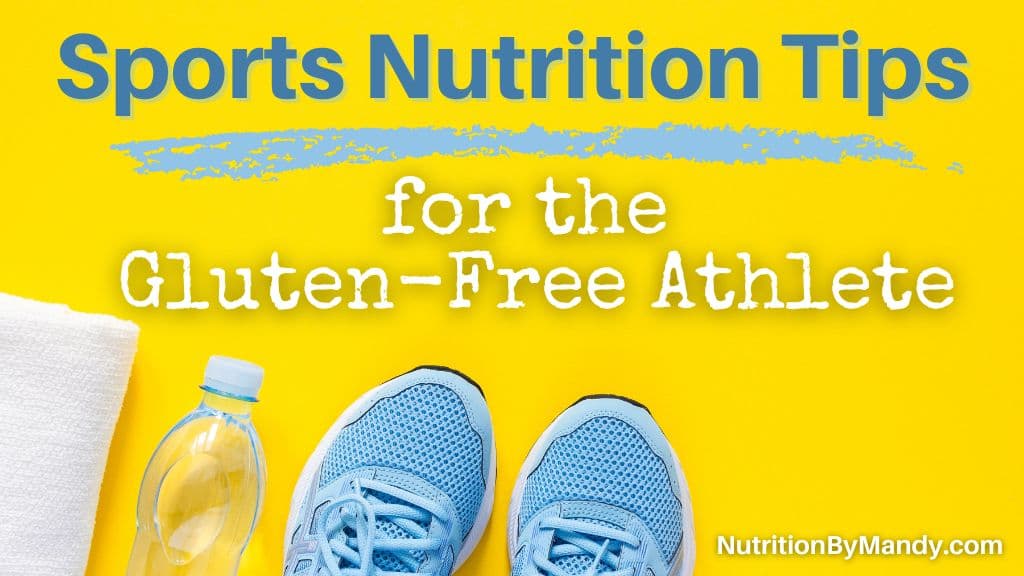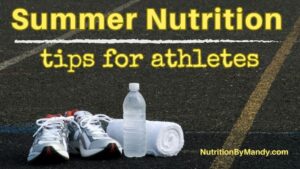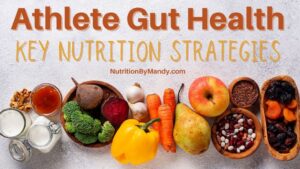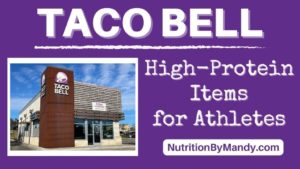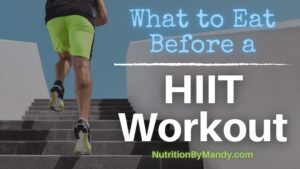Last Updated on June 24, 2025 by Mandy Tyler, M.Ed., RD, CSSD, LD
Sports Nutrition Tips for the Gluten-Free Athlete
It is important for athletes following a gluten-free diet to know how to meet their sports nutrition needs.
Let’s take a look at what gluten is and who should follow a gluten-free diet. Then we will explore sports nutrition strategies for the gluten-free athlete.
What is Gluten?
Gluten is a naturally occurring storage protein found in wheat, barley, and rye, as well as hybrids of these grains. It helps provide structure, texture, and elasticity to food products (1).
Gluten is heat stable and may be added into processed foods to help the product retain moisture, enhance texture, and maintain form (1).
Based on these properties, items such as processed meats, vegetarian meat substitutes, thickeners, seasonings, stuffings, marinades, and dressings may contain added gluten (1).

Who Should Follow a Gluten-Free Diet?
There are specific medical conditions which necessitate that individuals follow a gluten-free diet, such as athletes with celiac disease or non-celiac gluten sensitivity, as well as athletes with wheat allergies (2).
Athletes with Celiac Disease
Celiac disease is an autoimmune disease in which individuals develop an intolerance to gluten (3).
When individuals with celiac disease ingest gluten, it causes an immune response that damages the lining of the small intestine (3).
Athletes that have celiac disease must follow a strict gluten-free diet.
Athletes With Other Gluten-Related Disorders
In addition to celiac disease, athletes with other gluten-related disorders, such as non-celiac gluten sensitivity, are advised to follow a gluten-free diet to help alleviate symptoms (2).
Athletes with an allergy to wheat must avoid consuming wheat and wheat containing products to prevent an allergic reaction from occurring (2).
Pro Tip: Athletes should visit with a physician if they have concerns regarding the consumption of gluten or feel they may have a gluten or wheat-related disorder.
Should All Athletes Follow a Gluten-Free Diet?
It is not necessary for athletes to eliminate gluten or wheat from their diets if they do not have celiac disease, a wheat allergy, or other gluten-related disorders.
Following a gluten-free diet will not result in improved performance in athletes who do not have celiac disease or other gluten or wheat-related disorders (4, 5, 6).
Fuel Your Workout: Gluten-Free Carbs for Athletes
Carbohydrate-rich foods should be at the foundation of an athlete’s meal plan.
Carbohydrates provide athletes with the energy needed to perform at their best during training and competition. Similar to gas used to fuel a car, carbohydrates provide fuel for the body to run on during activity.
Carbohydrate recommendations for athletes are typically based upon the intensity and duration of the exercise session. Athletes participating in higher intensity or longer duration sessions require more carbohydrates to support performance (7).
Carbohydrates for the Gluten-Free Athlete
Although athletes following a gluten-free diet must avoid gluten containing grains, there are numerous other ways athletes can add carbohydrates to their diet.
Athletes following a gluten-free diet can get carbohydrates from a variety of food groups, including:
- Gluten-free grains
- Fruit
- Starchy vegetables, beans, and legumes
- Dairy: Milk and yogurt

Gluten-Free Grains
Athletes following a gluten-free diet need to avoid wheat, barley, rye, and crossbreeds of these grains.
However, there are a variety of other grain options that are naturally gluten-free, including (8):
- Rice
- Corn
- Quinoa
- Millet
- Amaranth
- Arrowroot
- Buckwheat groats
Even when products are made with gluten-free grains, it is important for athletes to read the food label carefully. It is possible gluten containing ingredients were added to the product.
In addition, cross-contamination with grains containing gluten may occur during harvest and production (8).
Are Oats Gluten-Free?
Oats are also naturally gluten-free. However, oats are considered high-risk for cross-contamination with wheat, barley, and rye during harvest and processing.
In addition, some individuals with celiac disease may have a reaction to other components within oats that cause discomfort (2).
The Celiac Disease Foundation recommends individuals on a gluten-free diet only purchase oat products specifically labeled as being gluten-free. It is also recommended that individuals visit visit with their doctor and dietitian prior to adding oats to their gluten-free diet.
Fruit and Vegetables
Fresh fruits and vegetables are naturally gluten-free and a great way for athletes to add carbohydrates to their diets.
In addition to carbohydrates, fruits and vegetables provide vitamins, minerals, and fiber, making them a nutritious choice for athletes.
Starchy vegetables that provide a good source of carbohydrates include:
- Potatoes and sweet potatoes
- Corn
- Green peas
- Winter squash (acorn, butternut, pumpkin)
- Beans and legumes
Fruits and Vegetables: Frozen, Canned, Dried, Juice
When purchasing frozen, canned, or dried fruits and vegetables, athletes following a gluten-free diet need to read the food label carefully. It is important to make sure that no gluten-containing ingredients were added during production to the produce.
Individuals should use particular caution with produce containing added seasonings or sauces, as well as with frozen potatoes or pre-made smoothie blends (8).
Most 100% juices are gluten-free. However, athletes should review the ingredient label closely to verify no ingredients containing gluten were added to the juice.

Dairy
Milk and yogurt are also gluten-free carbohydrate options for athletes. In addition to carbohydrates, dairy products provide protein, calcium, and many are fortified with Vitamin D.
Athletes should use caution with dairy products that contain added ingredients (i.e., flavorings, granola or cookie topping for yogurt), which may contain gluten.
Protein for Gluten-Free Athletes
Including lean protein in the diet is important for athletes to support the building, repair, and maintenance of lean muscle mass.
To get the most benefit from protein intake, athletes are encouraged to consume protein throughout the day with meals and snacks (9).
Gluten-Free Protein Options for Athletes
Similar to fresh produce, fresh meat, poultry, seafood, and pork are naturally gluten-free.
Athletes should carefully read food labels for all processed meats (i.e., deli meat, frozen meat, sausage, reconstituted seafood) to ensure no gluten-containing ingredients were used in production (1).
In addition, check all marinades, seasonings, and breading used to prepare meats for ingredients with added gluten (1).
Pro Tip: Check out my blog on high-protein gluten free snacks for a variety of snack ideas that athletes can add to their sports nutrition meal plan.
Plant-Based, Gluten-Free Protein Sources for Athletes
Gluten-free protein options that athletes following a plant-based diet, include soy, nuts, seeds, beans and legumes.
While soy is naturally gluten free, carefully review food labels for all soy-based meat substitutes as well as tofu with added marinades or seasonings. Athletes should also use caution with products such as soy sauce and teriyaki sauce, which often contain gluten (10).
Is Seitan Gluten-Free?
Athletes following a vegetarian or vegan diet should be aware that seitan is made from wheat gluten. Thus, athletes on a gluten-free diet should not eat seitan as a source of protein.
In addition, athletes should read product labels closely on vegetarian meat substitutes and products to make sure seitan is not an added ingredient (10).

Sports Nutrition Gluten-Free Strategies for Athletes
It can be helpful for athletes to have ideas for gluten-free meals and snacks they can enjoy before and after a workout.
When time is limited prior to activity, athletes should focus on eating a gluten-free, carbohydrate-rich pre-workout snack. Ideas include:
- Small piece of fresh fruit
- Dried fruit, fruit leather (verify gluten-free)
- Applesauce squeeze pouch (verify gluten-free)
- Gluten-free pretzels
- Gluten-free dry breakfast cereal
- Gluten-free granola bars
If athletes desire a sports drink, gel, chew, or bar to enjoy prior to or during a workout, they need to read the ingredient label closely to verify the item is gluten-free. Sports bars in particular may include added ingredients that contain gluten.
Is Gatorade Gluten-Free?
A question I often receive from athletes is whether or not Gatorade is gluten-free. According to the Pepsico website, the following Gatorade products are not formulated using any gluten-containing ingredients:
- Gatorade ready-to-drink
- Gatorade mix
- G2 products
- Recover Protein Shakes
- Recover Protein Powders
- Prime Energy Chews
- Gatorade Endurance
However, Gatorade acknowledges that their products have not been tested to be gluten-free. In addition, they note the possibility of cross-contamination with gluten-containing foods during processing.
Gatorade also notes that some flavors of their Recover Whey Protein Bars contain wheat, as do the Prime Fuel Bars. In addition, some of the ingredients in the Prime Nutrition Bars may contain gluten.
Pro Tip: Athletes should note that product formulations can change at any time. For the most current information on the ingredients contained within Gatorade products, athletes should refer to the Gatorade website.
Gluten-Free Recovery Nutrition Strategies
Following a workout or competition, athletes should focus on replacing the fuel and fluid used during the activity. This is particularly important when the time between workout sessions or games is limited.
Three key areas athletes should focus on when it comes to recovery nutrition include.
- Fluid and Electrolytes: Rehydrate to replace fluid and electrolytes lost in sweat
- Carbohydrates: Refill energy stores (glycogen stores) used during the activity
- Protein: Build and repair muscles

Gluten-Free Recovery Nutrition Snack Ideas
Athletes following a gluten-free diet should plan ahead to ensure they have healthy recovery nutrition snacks available.
Here are a variety of gluten-free recovery nutrition snack ideas for athletes:
- Greek yogurt with berries and gluten-free granola
- Apple slices with mixed nuts and low-fat milk
- Hard-boiled eggs with gluten-free granola bars
- Trail mix made with mixed nuts, seeds, dry fruit, gluten-free pretzels, and gluten-free cereal
- Nut butter and honey sandwich on gluten free bread with low-fat milk
- Cottage cheese with fresh, sliced peaches
- Gluten-free cereal with high-protein milk
- Fruit smoothie (verify all added ingredients are gluten-free)
Athletes should aim to follow-up their recovery nutrition snack with a well-balanced meal in the next couple of hours.
Eating Gluten-Free at Restaurants
It is important that athletes following a gluten-free diet are diligent when dining out to carefully read restaurant menus and websites to locate gluten-free items.
Athletes should also visit with the restaurant server or chef to ensure items are prepared gluten-free.
Although many restaurants now offer gluten-friendly menu items, it is common for restaurants to note that cross-contamination with gluten-containing items may occur. Thus, individuals are cautioned regarding the potential to come in contact or inadvertently consume gluten in the meal.

Sports Nutrition for the Gluten-Free Athlete
You are now set with ideas for meeting the sports nutrition needs of athletes following a gluten-free diet.
Athletes should take time to plan ahead to ensure they have healthy meals and snacks available to support their nutrition needs and performance goals.
For additional gluten-free tips, check out my blogs: Chipotle Gluten-Free Options for Athletes and First Watch Gluten-Free Options for Athletes.
Join the Nutrition By Mandy Email List & Get a Free Weekly Meal Planner Template
Click HERE to join the Nutrition By Mandy e-mail list. When you join you will receive a free weekly meal planner template to download and plan out your meals for the week.
About the Author
Mandy Tyler is a Sports Dietitian Nutritionist in the San Antonio, TX area. She is a Registered and Licensed Dietitian, a Board-Certified Specialist in Sports Dietetics, a Licensed Athletic Trainer, and is a Certified Exercise Physiologist through the American College of Sports Medicine. Mandy has experience working with athletes at the high school, collegiate, and professional levels. She believes the key to reaching one’s full potential, both in everyday life and in sports performance, relies on a healthy nutritional foundation.

If you are looking to take your performance to the next level, make sure to check out my new Sports Nutrition Game Day Guide. This downloadable guide is written to help athletes develop an individualized plan to achieve peak performance on game day.

